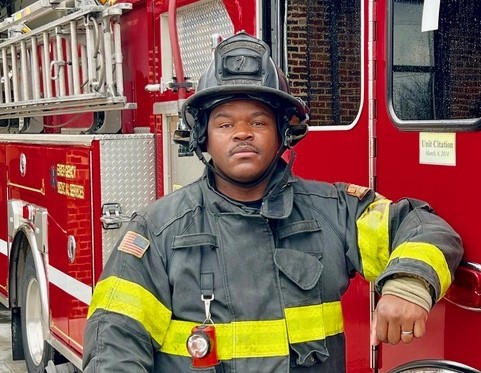There’s a lot to unpack when it comes to Charles Cordarra Munford. Reared in poverty in South Memphis surrounded by murders, gangs, drugs and all matter of crime; his grandmother, sports and chess – and his character – saved him. Today he’s a hard-working master firefighter for the Knoxville Fire Department (KFD) in his 10th year at Station 7 in Lonsdale.
After graduating from Raleigh-Egypt High School in 2004 as a two-year football starter and an All-Region tight end and linebacker, Munford came to the University of Tennessee football squad as a walk-on (no scholarship). He turned down offers from smaller schools to be a walk-on for the Vols. “The atmosphere, the passion of the fans and their love for football that the fans have and the history of the team … all that brought me to Knoxville,” he said. “Whatever happened I was not staying in Memphis.”
He stayed for two years as a linebacker but never got into a game and gave up his dream. “I always wanted my name on the back of a jersey and now my name is on the back of my turn-out gear.”
He’s 36 now and drives Engine 7 on the Red shift. That’s one of his jobs. Munford’s second job is having his own company – Munford Home Inspections. He is a state-certified home inspector since 2020 that keeps him hopping on his off days at KFD. He also works part-time for Lifeguard Ambulance Service making non-emergency transport calls. In between his jobs you can find him at National Fitness working out, maintaining his 6-0 feet, 240-pound linebacker body.

Charles Munford and daughter Brielle
He’s quick to tell you his most important jobs are at home – caring for his wife, Brittany, a registered nurse at UT Medical Center, and their 10-year-old daughter, Brielle. He and his wife have another job – they share home-schooling Brielle. His UT days were not wasted – that’s where he met Brittany. Today they worship at Oak Grove AME Church.
His work ethic is founded on his early life in poverty. “I have been focused on changing my life to make a difference for my family. It was rough in Memphis and I had to work hard to avoid that environment and not get caught up in what was going on all around me. Learning how to play chess in junior high and high school taught me a lot. It teaches you about consequences. Before you make a move, you have to think before you move and that applies in life every day, at work or at home.
“You need to think about it before you speak. Each chess piece plays a role in the strategy and sometimes you have to sacrifice. Just like life.”
Work came quick after UT. He worked at the Pilot Station on The Strip for seven years and was its co-manager when he left for the KFD in July 2012. It has been a career he loves. A job he respects.
“It is very fulfilling and I enjoy helping people. If you take everything I’ve done – the street knowledge from when I was young, the football and teamwork, the chess … it all came together and I found my purpose in my life. It’s who I am today.”
But his scariest time was in a Lifeguard Ambulance on June 9, 2019. He was riding shotgun and his driver tried to beat a slow-moving Norfolk Southern train crossing at World’s Fair Park Drive and Grand Avenue near The Foundry. The train, traveling at only10 mph, clipped the back of the ambulance on Munford’s side.
“That train was big and I was screaming. The horn was blowing and it spun us around and around and thankfully we didn’t get hurt,” he remembers like it was yesterday. Thankfully, there was no patient on board.
Working in Lonsdale reminds him of where he grew up – especially the crime and the poverty. “My neighborhood was 99.9% African-American. Lonsdale today is a majority Hispanic community with African-Americans and whites,” he said.
“We fight a lot of fires in Lonsdale and have one to two overdoses per shift, sometimes more. It’s not so much the teenagers but young people in their early and late 20s and some in their 60s. And they are mostly women. Fentanyl and heroin mostly and sometimes they don’t make it. The Hispanics are not doing the drugs and overdoses. It’s everybody else.”
Two calls left him with bad memories. “We found a guy who’d been stabbed a lot, 20 to 30 times. He was still alive but he was bleeding so bad you didn’t know where to start or how to help him and he died. And we recently had a 17-year-old kid who was shot to death. I could not help him but I could relate to him. He probably thought he knew it all and nothing would change his mindset. It’s so sad to see things like this, but that’s our reality today.”
The massive Gatlinburg fire in 2016 got his attention and scared him more than other fire calls. “That was a time when I didn’t think I’d make it home.
“On the drive up, you see everything burning once we entered the parkway. Multiple cabins and businesses burned to crumbs. I remember looking at the senior guys and seeing the concern on their faces. We’re talking guys that are some our best firefighters. I only had like four years on the job at the time. Seeing them like that, it instantly became contagious. Once we got there, we staged for a while and then got our assignment. We all went out and did our jobs as best we could, and most importantly, all made it home safely.”
Tom King has been the editor of newspapers in Texas and California and also worked for newspapers in Tennessee and Georgia.

